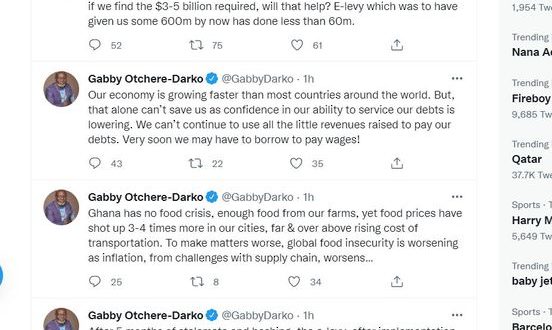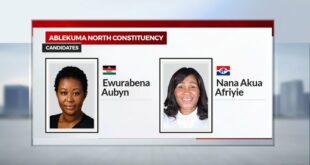A leading member of the New Patriotic Party (NPP), Gabby Otchere Darko has said that the e-levy, after its implementation on May 1 2022, is delivering only 10 per cent of estimated income.
The former Executive Director of the Danquah Institute lamented the low revenues in Ghana as compared to the rest of the world and also debt levels which he said is dangerously high.
In series of tweets on Monday June 27, he said “What options are open to government? The question should rather be: what option, if adopted, will re-inject investor confidence in our economy? Even if we find the $3-5 billion required, will that help? E-levy which was to have given us some 600m by now has done less than 60m.
“Our economy is growing faster than most countries around the world. But, that alone can’t save us as confidence in our ability to service our debts is lowering. We can’t continue to use all the little revenues raised to pay our debts. Very soon we may have to borrow to pay wages!
“Ghana has no food crisis, enough food from our farms, yet food prices have shot up 3-4 times more in our cities, far & over above rising cost of transportation. To make matters worse, global food insecurity is worsening as inflation, from challenges with supply chain, worsens…
“After 5 months of stalemate and bashing, the e-levy, after implementation, is delivering only 10% of estimated revenues; our revenues remain very low as compared to the rest of the world; debt levels dangerously high, cedi, like most currencies, struggling against the US dollar.”

Regarding calls for Ghana to return to the International Monetary Fund (IMF), Mr Otchere Darko said in principle, he is not against the IMF programme.
He explained that he is not for an IMF programme that gives the country peanuts but imposes conditions that will end up hurting the poor, jobs and businesses more.
In series of tweets on Monday June 27, he said “Am I against an IMF program in principle? No”
“I am not for an IMF program that throws peanuts at us but imposes conditions that will end up hurting the poor, jobs and businesses more. Covid-19 and War in Ukraine are not of Africa’s doing but more to our doom. A program that pretends it is all our doing is doomed to fail.”
“We do something that will inject confidence in our capacity to ride this heavy storm and that something should happen pretty quickly. Are you against an IMF program?”

Recently, the Chief Operations Officer at the Dalex Finance, Mr Joe Jackson said that Ghana needs to go back to the IMF.
It was his view that the country was not going to be able to resolve its fiscal challenges without going to the Bretton Wood institution for support.
Speaking in interview with TV3’s Komla Adom on the mid day news on Tuesday June 21, Mr Jackson said “I think the IMF is the most option to check the excesses we face.
“Our budget deficit is huge, there is no fiscal space, we need the IMF to support us so that the foreign markets and the flow of funds will be maintained. I honestly don’t see how we will get round this without going to the IMF.”
Another economist, Dr Adu Sarkodie also said recently that Ghana is likely to return to the IMF for support.
He says if this finally happens, it will affect some of government’s programmes such as the free Senior High School, Nation Builders Corps (NABCO) and others.
“We are likely to go back to the IMF. I don’t like it when we go there because of the conditionality. They may ask us to cancel Free SHS, NABCO, and all that but this is the time we need all these social interventions,” Dr Adu Sarkodie told 3FM on Thursday June 16.
The Finance Minister, Ken Ofori-Atta, recently insisted that Ghana would not go back to the IMF for support.
In his view, the government has put in place measures including salary cuts and others, and also programmes to deal with the fundamental issues affecting the economy.
Mr Ofori-Atta said these when he was asked by expatriate journalist whether Ghana would consider going back to the IMF, at a press conference in Accra on Thursday May 12.
He said while answering the question that “All the white folks are just interested in us coming in the IMF programme. I always wonder why.”
“We are members of the fund; there are two major points of interventions that we have from the fund. One being the advise that we get because of the phenomenal expertise that the fund has and then secondly, these programme interventions which bring us some resources.
“I think, if you see from the budget that we constructed for 2022 and the subsequent announcement that we have done, clearly, the issue of Ghana having the capacity to think through the consolidation exercise exist. Also discipline itself with regards to the 20 per cent, etc, that we have shown clearly.”
He further indicated that “We have committed to not going back to the fund because in terms of the interventions and policy we are right there, the fund knows that we are completely in the right direction. The issue is, validating the programmes that we have put in place and then, in my view, supporting us to find alternative ways of financing or re-financing our debt, reprofiling it.”
Source: 3news
Send your news stories to myghanamedia@gmail.com and Chat with us via WhatsApp on +233 200818719
 MYGHANAMEDIA.COM Best Source Of Latest News
MYGHANAMEDIA.COM Best Source Of Latest News





